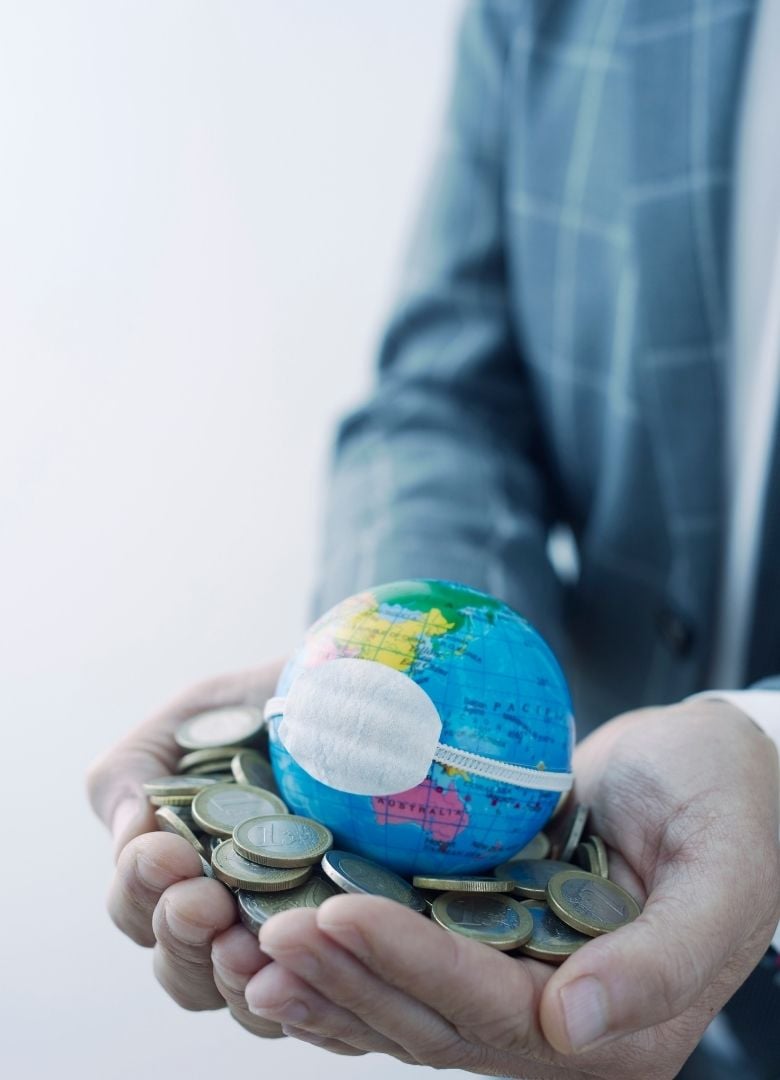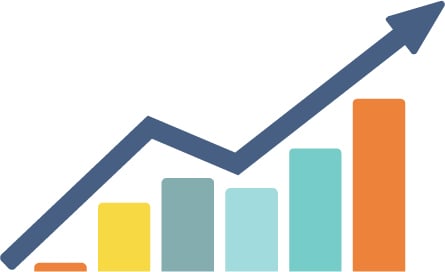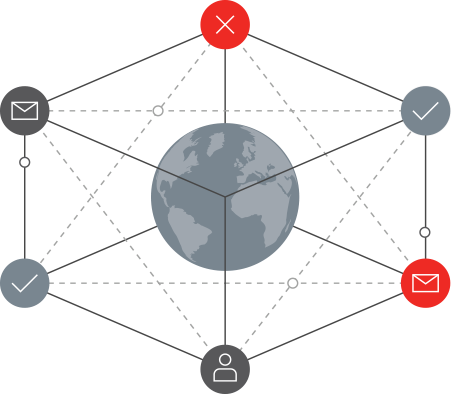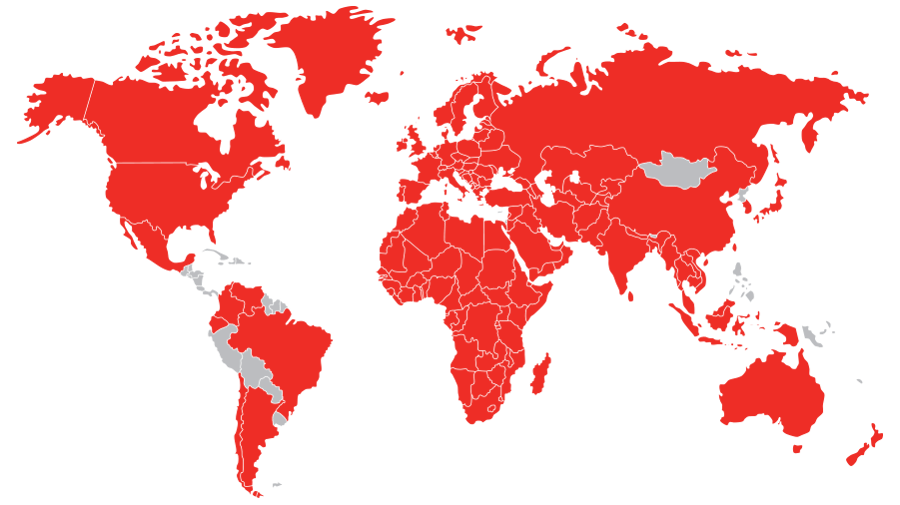Commercially, international business provides fantastic opportunities for an organisation's growth, but from a credit risk perspective, international business is even riskier than domestic business. And even though you may be working 100% domestically, don't forget that 8 out of 10 of your business relations have an international link: "screen global, always!
Even if you only buy local, always screen global
Every Belgian company works internationally (even if you don't know it).

The desire to expand internationally continues to grow in Belgium, which is not illogical given our current market position. Our country connects other countries and this connection forms the basis of our international "hunger". International business - import and export - is an important aspect of your risk management. Even if you have a complete focus on the national market, indirectly you also work with international organisations - fact check.
Belgium is a very active country in conducting international business. To work across borders, you need to know the markets and their players. You need to collect company data on potential customers, on how the market is evolving there, on the financial strength of your international business relations, the flexibility of your suppliers, and so on. In other words, you collect data that you use and analyse to make an effective decision (or transaction).
Therefore, it is important to understand what you need to do, where the opportunities lie, what risks are present and what measures you need to implement when operating internationally - even if you think you only work within the Belgian borders.
Belgium: transit by excellence - an overview
Strategically and geographically, Belgium is the most important transit country in Europe. Our country forms an important crossroads between the South and the North of Europe and connects Eastern Europe with the West.
We owe this to our highly varied transport network and capacities. Just think of the presence of the various air and sea ports, the dense road and rail network and the various maritime canal points.
Belgium is the 13 biggest exporter in the world and the 14 biggest importer globally. More than 70% of imports and exports take place within Europe, amounting to over 340,000.0 million euros. More than 30% of Belgian companies work across borders. Our top 3?
- More than 76% happens and stays in Europe, with our neighbouring countries in the lead.
- Around 11% is destined for the Asian market.
- And some 10% Goes to the American market.
Almost 1 out of 2 companies works with foreign suppliers. Chemicals, transport equipment and mineral raw materials form the top 3 of the Belgian imports.
Total export percentage
Total import percentage
Total export numbers Belgium 2020
Total import numbers Belgium 2020
Overview top 10 export countries
Overview top 3 export products
*Source EUROSTAT - COMMUNITY CONCEPT – Belgian Foreign Trade Agency
Everyone is doing business internationally, directly and indirectly
Creditsafe states that every small, medium and large Belgian company works directly or indirectly with international companies.
It is a statistical fact that as a company continues to grow in employees, the likelihood of international operations increases. Even if you are of the principle that you work 100% nationally, indirectly you are in contact with international companies. Let us assume that your entire customer portfolio is active in Belgium, then you could reason that you are 100% active on the national market. The answer is no...
Your professional clients may be included in a group structure where, for example, the parent company is located abroad. If a parent company is located in e.g. Germany, you are de facto doing business with a German organisation. A company does not necessarily have to be included in a group structure. They can also be 'linked' to foreign companies. The directors of a company with which you do business may also have mandates in other countries or the owner or founder of your most loyal customer may be, for example, an Italian.
For these obvious reasons, it is also vital to check the international links, structure and other mandates so that you can make a more complete assessment, as part of your credit risk management.
Suppose one of your professional clients has a parent company in the United States and this parent company is in bad shape, this could have negative consequences for the subsidiaries. If you have not checked the international structure, you have not been able to make a proper risk assessment.
If you then work with international suppliers, you are logically also dealing with international companies. Finally, do your competitors originate from outside Belgium? Then your organisation is also indirectly international.
What elements do you definitely need to check if you work internationally?
The global pandemic has shown us that it has never been more important today to screen, control, monitor and credit check your international business relationships (and markets).
Problems in potential supply chains, challenges in reliability and the financial resilience of companies in other countries are key international concerns for everyone's credit and risk organisation.

Doing business with international companies can therefore be risky, regardless of the size of your company and organisation. On-time payments and good communication are crucial for the continuity of your business. If a payment is late or the business partner cannot deliver on time, your company may face continuity problems. This can even lead to you not being able to perform essential business activities, such as receiving and making payments, to keep your company running.
Therefore, it is important to be well informed. To work across borders, you need to know the markets and their players. You need to collect data on potential customers, on how the market is evolving there, on the financial strength of your international business relations, the flexibility of your suppliers, and so on. In other words, you collect data that you use and analyse to be able to make an effective decision (or transaction).
You can always try to find the information you need by searching online, submitting applications to local authorities, asking questions at the company itself, and so on. If you have to do this for every new and existing international partner, you not only lose a lot of time, but also a lot of resources and even the possibility of losing potential turnover. That should not be the intention.
What aspects should you definitely investigate?
-
The company credit rating
International credit reports represent the basis of your credit rating research.
As these reports provide the necessary and detailed information about the finances and general credit history of an international organisation.
The international credit reports from Creditsafe have a standardised, uniform credit score that tells you immediately whether your business relation is solvent or creditworthy. In fact, you can perform a credit check in a few seconds and compare companies in different countries.
-
The official company information
An indispensable aspect when generating your invoices, even if you only operate in Belgium.
Correct and official company information is a must if you have to generate invoices (and if you like to be paid correctly). For example, the address mentioned on a website may be different from the official invoice address. The commercial company name of an organisation can also differ from the official name. For companies that only work in Belgium, it is perfectly possible that your partner is a foreign company, which means that you are actually invoicing abroad, directly or indirectly (again, "screen global, always").
Therefore, it is certainly advisable to contact a provider of business data information, such as Creditsafe. Our credit reports have the most complete, up-to-date and official company information data, all in one view, with the possibility to integrate this company data into your CRM or ERP systems, via our API Connect. This way, you are really sure that you can invoice and get paid correctly.
-
The reliability of your business partners
Business decisions are influenced not only by the state of the present economy, but also by elements such as fraud, terrorism and corruption.
Given the current economic climate, we can only say that such screenings, audits and investigations are only growing in importance and that it has become essential to investigate the background of potential business partners and companies with whom you intend to do business abroad; to check not only their credit risks, but also for any other negative elements before committing to any transactions or collaborations.
Gain a deeper understanding of the companies you work with using our compliance solution Protect, where we effectively support our clients with a global screening and audit to clearly identify their exposure to regulatory and reputational risks. Protect supports you to simplify your Customer Due Diligence screening or your Know Your Customer Check (= KYC) and the overall compliance audit with an all-in-one platform. Via our direct link and access to the LexisNexis WorldCompliance database you have access to global adverse media, PEP profiles, sanctions lists and enforcement databases through a single search
-
External legal and economic factors
Every country has its own specific laws, regulations, customs and cultures
In your international research, you should keep in mind that the requirements for registration as well as for disclosure of a company's financial performance may be quite different for companies abroad. The availability of information may also be scarce, depending on how it is legally structured.
If tracking incoming payments and ensuring that companies and partners always deliver on time is already a challenge for your organisation, consider what happens when you factor in elements such as time zones, language barriers, different laws, cultures, regulations and tax systems. A combination of the above elements can make international business a major challenge.
Furthermore, you need to monitor whether the countries you are operating in (or wish to approach) are economically and politically stable. It is therefore also a good idea to check whether there are any international trade agreements between Belgium and the country (or countries) you intend to do business with. There may be certain safeguards in place to support you should something go wrong.
Here are a few more things and tips that are also important in the country you want to do business:
- A strong supply chain?
If your supplies are cheaper abroad, they may also be of lower quality.
Lower quality can lead to higher costs for a company, as this can result in unsatisfied customers. It is important to find a balance between cheaper suppliers and keeping your customers happy. Also be careful with the exchange rate. - Do you know the customs, culture and politics of the country?
What works well in Belgium will therefore not automatically work well in, say, China. Do sufficient research into the target groups of the country in question. Be aware of the latest political developments, do some research on legitimacy and understand how to communicate. - Is the competition already active?
If the competition is already active in the (new) market, this can be a good sign. This means that there is already supply and demand. You can take the opportunity to find out what works for your competitors and what doesn't, and decide how you can stand out from them to even become the market leader. - Are you legally ready?
Laws can vary drastically from country to country. Make sure your terms and conditions, privacy regulations and so on are in line with the laws and standards. Not only company laws, but also regulations concerning your employees (and their rights) should be observed.
Always Be Prepared & Informed
When operating in international waters, always be prepared and well informed. We advise you to make use of market research studies, agencies, government institutions (such as the 'Belgian Foreign Trade Agency' and/or 'Flanders Investment & Trade'), and business data & information providers, such as Creditsafe. In this way, we help our customers to take, on average, 450.000 business credit decisions per day on a global scale.
The data we can deliver (with the possibility to integrate it automatically) on more than 365 million companies and individuals in 160 countries, will help you to make the right decisions on risk & credit management level.
Data is the new gold and an absolute necessity in these unprecedented and challenging international times.
Request access to our international database
Please use the interactive map below to access the country you wish to access
Download our international company data guide or consult the region-specific representation
-
More than 365 million company credit reports available around the world
-
99.9% of the requested credit reports are available immediately and online
-
Compare companies from different countries with our uniform international credit score


